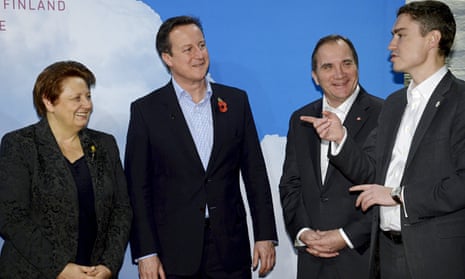David Cameron has made clear he will not accept a mooted compromise deal on the EU’s £1.7bn budget demand – and said the row is pushing Britain towards the exit door.
Appealing for help from northern European counterparts over dinner at a summit in Helsinki, the prime minister brandished polling suggesting the issue was hardening voters’ views.
He warned leaders at the Northern Future Forum that the announcement of the surcharge had triggered a 10% swing towards leaving the union among British voters.
Proposals being circulated in Brussels would see the UK allowed to pay its bill in instalments next year – rather than in full by 1 December. Punitive interest payments on the debt would also be waived.
But Cameron told premiers from Finland, Estonia, Sweden, Denmark, Iceland, Latvia, Lithuania and Norway that the headline figure of the demand was “unacceptable”, as was the short notice.
According to Downing Street, Cameron insisted the bill – calculated by officials based on a reassessment of economic performance over the past decade – could not be treated as a “purely technical transaction”.
The prime minister, who has previously said Britain will not pay “anything like” £1.7bn, argued that the row was a “prime example of where the EU needs to show more flexibility and respond to voters’ concerns”.
He also said that, while the UK has been hardest hit this time, other states could find themselves in similar positions in future.
The government is hoping EU finance ministers will give political impetus to efforts to find a solution when they meet on Friday.
But George Osborne, the chancellor, could face a difficult task after other countries signalled their backing for the suggested compromise.
Irish finance minister Michael Noonan reportedly said: “I think everybody should pay what’s due and abide by the rules in Europe but I have no objection to the British government settling their account by way of instalment over 2015.
“If they pay the capital amount on an agreed instalment basis, that should be sufficient.”
The UK’s position could be further weakened by indications that the Netherlands – which was hit with a £600m surcharge – is ready to go along with the deal.
Earlier, Britain’s new EU commissioner, Lord Hill, appealed for “calm” to help find a resolution in the dispute.
But Tory backbencher Peter Bone urged a blunt response to the latest suggestion.
“The prime minister should tell them to get stuffed,” he said. “The idea that it can be paid in instalments is laughable and absurd.”
